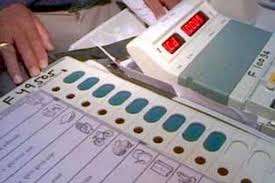New Delhi, Oct 4: For the first time, the Election Commission will provide the ‘None Of The Above’ option in EVMs for the 11 crore voters who will exercise their franchise in the five States going to polls beginning next month.
Announcing the schedule for Assembly elections in Delhi, Mizoram, Rajasthan, Chhattisgarh, Madhya Pradesh and Rajasthan, Chief Election Commissioner V.S. Sampath said in New Delhi on Friday that the Election Commission is taking necessary steps to make available the NOTA option for voters in the electronic voting machines.
“The Election Commission is working out details and steps for introduction of NOTA option in these polls itself,” Mr. Sampath told a press conference.
Till now, this option is not available to voters on ballot papers and EVMs. Voters so far had to register their option of NOTA in a register under Rule 49-O of the Conduct of Election Rules, thus compromising secrecy.
In its September 27, 2013 judgement, the Supreme Court had directed the EC to provide the NOTA option on ballot papers and EVMs.
The apex court had said that the EC should implement it either in a phased manner or at a time in assistance with the central government.
Below the name of the last candidate on the EVMs, the EC will now provide a button for the NOTA option for electors who do not wish to vote for any of the candidates in the fray in their constituency.
“The Commission is taking steps to bring this to the knowledge of voters and all other stakeholders and to train all field level officials, including polling personnel about the NOTA option,” Mr. Sampath said.
Former CEC S.Y. Quraishi had recently written an article about the NOTA option saying that such votes will be counted as “no votes” and would not affect the result of the poll.
“For democracy to survive, it is essential that the best available men should be chosen as people’s representatives for proper governance of the country. This can be best achieved through men of high moral and ethical values, who win the elections on a positive vote.
“Thus in a vibrant democracy, the voter must be given an opportunity to choose none of the above button, which will indeed compel the political parties to nominate a sound candidate. This situation palpably tells us the dire need of negative voting,” the Supreme Court bench had said.
Referring to another apex court judgement on filling all columns in election affidavit, Mr. Sampath said now it is obligatory for the Returning Officer (RO) to check whether the information required is fully furnished.
Now, if any of the columns is left blank by a candidate, the RO will issue him a notice to complete the affidavit. If the candidate fails to do so despite the notice, his nomination paper is liable to be rejected at the time of scrutiny.
In another first, the EC will now deploy ‘awareness observers’ who will oversee measures for voter facilitation with a view to motivate voters and increase turnout.
Awareness observers will be deployed in two phases of seven days each and will monitor steps being taken by the election machinery to bridge the gap in people’s participation in the electoral process.





Comments
Add new comment